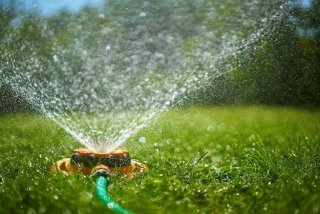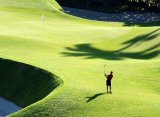Reusing Water for Landscaping Resources

Water reuse for landscaping is the use of treated recycled water for the irrigation of land containing non-edible vegetation in residential and non-residential areas. Impoundments can be used to store the recycled water for irrigation of ornamental vegetation, parks, school yards, sporting facilities (including golf courses), private gardens, roadsides and greenbelts, and cemeteries. Water reuse for landscaping helps to reduce demands on freshwater supplies. In some cases, it helps to reduce the quantity and cost of fertilizer needed for land application, as reclaimed water can be nutrient rich. Information on reusing water for agricultural activities.
Water reuse is the practice of reclaiming water from a variety of sources, treating it, and reusing it for beneficial purposes. The following resources relate to reuse for landscape irrigation; for information on other uses, please visit the Water Reuse Resource Hub by End-Use Application.
On this page:
Key Resources
The following are a sampling of the key water sector resources that are freely available to support water practitioners interested in developing landscape irrigation water reuse projects. Visit the Water Reuse Information Library for additional water reuse materials.
- 2025 Risk Based Framework for Developing Microbial Treatment Targets for Water Reuse – This EPA document provides detailed scientific information that states and Tribes can use to develop risk assessments and microbial treatment targets that support safe potable and non-potable water reuse.
- Reclaimed Water Use in the Landscape Series (2020) – The University of Florida’s Institute of Food and Agricultural Sciences (UF/IFAS) created fact sheets and a frequently asked questions guide about water reuse for landscape irrigation. Fact sheet topics include understanding constituents of concern in reclaimed water for use in landscape irrigation, landscape irrigation water quality tests, and defining substances in reclaimed water. The UF/IFAS Environmental Landscape Management Series also offers several relevant publications, including a guide for maximizing benefits for landscape irrigation while ensuring environmental protection.
State Water Reuse Regulations and Guidelines
The following states developed guidelines and regulations for landscape-related applications. Click the links from the REUSExplorer to review summary documents, which include the state regulations authorizing the use of recycled water for landscape irrigation, water quality and treatment specifications, definitions, and more!
Project Examples

City uses lagoon system, a low input technology, to treat wastewater for golf course irrigation (Oswego, Kansas)
The City of Oswego, Kansas reclaims treated municipal wastewater from a lagoon treatment system, a low-input treatment technology to irrigate a local golf course during the warm months of the year. This helps to reduce potable water demands and save costs for both the city and the Oswego Golf Association. Water reuse also ensures a reliable water supply to keep the golf course green and operational during periods of drought. Although Kansas does not have dedicated state regulations for reusing treated municipal wastewater for landscaping, state regulators have used the authority delegated to them under the federal Clean Water Act to permit multiple beneficial reuse projects within the state.
Native American Tribe reduces demand on local supplies by reusing water for golf course irrigation (Minnesota)
The Shakopee Mdewakanton Sioux Community (SMSC) water reclamation facility treats municipal wastewater from Tribal residences and community business enterprises to be reused for landscape irrigation and environmental restoration. To help reduce unsustainable demands on the local aquifer, the community pursued water reuse approaches when it needed to build a new wastewater treatment facility. Annually, the community uses 10% of its treatment capacity, or about 35 million gallons (132 million liters) of treated water from its water reclamation facility to irrigate a local golf course and other landscaped areas. This reduces the demand on local groundwater supplies. The remaining treated wastewater helps support wetland restoration in the area.
